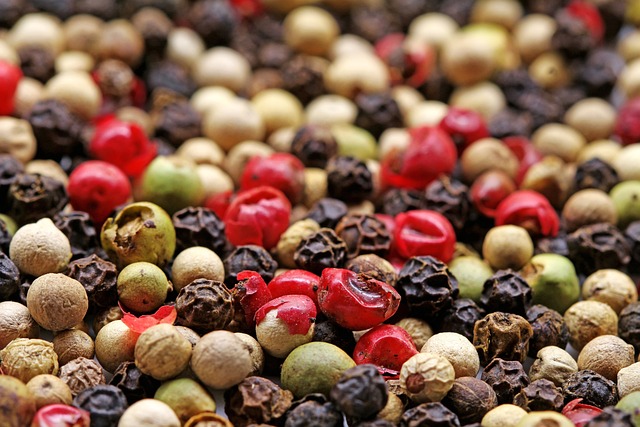Contents
The Unexpected Benefits of Using White Pepper in Your Health-Conscious Meals
White pepper is a popular spice that adds a unique flavor to your dishes. While most people are familiar with black pepper, white pepper has its own set of benefits that make it a great addition to health-conscious meals.
One of the main benefits of white pepper is its ability to aid in digestion. It has been used for centuries in traditional medicine to help soothe upset stomachs and improve digestion. The active compound in white pepper, called piperine, stimulates the production of digestive enzymes, which can help break down food more efficiently.
Additionally, white pepper has antimicrobial properties that can help fight off harmful bacteria in the digestive system. This can promote a healthy gut and reduce the risk of digestive issues such as bloating, gas, and constipation.
Another surprising benefit of white pepper is its potential to boost metabolism and aid in weight management. Research has shown that piperine in white pepper can increase the metabolism by stimulating thermogenesis, the process of heat production in the body. This can help burn more calories and potentially assist in weight loss efforts.
Incorporating white pepper into your meals can also provide antioxidant benefits. The piperine in white pepper acts as an antioxidant, protecting the cells in your body from damage caused by free radicals. This can help reduce the risk of chronic diseases and slow down the aging process.
Furthermore, white pepper has anti-inflammatory properties that may help reduce inflammation in the body. Chronic inflammation has been linked to various health issues, including autoimmune diseases, heart disease, and certain cancers. Consuming white pepper regularly may help lower inflammation levels and support overall health.
It is important to note that while white pepper offers numerous health benefits, it should be used in moderation. Its strong flavor can easily overpower a dish, so it is best to start with small amounts and adjust to your taste preferences.
In conclusion, including white pepper in your health-conscious meals can provide unexpected benefits such as improved digestion, boosted metabolism, antioxidant protection, and reduced inflammation. Experiment with this flavorful spice and enjoy its positive impact on your overall well-being.
The Unexpected Benefits of Using White Pepper in Your Health-Conscious Meals
1. Introduction
White pepper, often overlooked in favor of its more popular counterpart black pepper, has several surprising benefits when used in your health-conscious meals. This article explores the unexpected advantages of incorporating white pepper into your diet and highlights its potential impact on your well-being.
2. Enhances Digestion
An underrated benefit of white pepper is its ability to enhance digestion. The compound piperine present in white pepper stimulates digestive enzymes, aiding the breakdown and absorption of nutrients. Regular consumption of white pepper can help alleviate digestive issues such as bloating, gas, and indigestion.
3. Promotes Weight Loss
White pepper contains capsaicin, a natural compound known for its potential to boost metabolism and suppress appetite. Adding a pinch of white pepper to your meals can aid in weight loss efforts. Additionally, it helps increase the bioavailability of other essential nutrients, maximizing their absorption by the body.
4. Anti-Inflammatory Properties
White pepper possesses anti-inflammatory properties due to the presence of various antioxidants. Regular consumption of white pepper can help lower inflammation in the body, reducing the risk of chronic diseases such as arthritis, cardiovascular illnesses, and certain types of cancer.
5. Rich in Antioxidants
White pepper is rich in antioxidants, which play a vital role in protecting the body against harmful free radicals. These antioxidants help prevent oxidative stress, which contributes to aging and chronic diseases. By incorporating white pepper into your meals, you can boost your antioxidant intake and maintain overall health.
6. Aids Respiratory Health
The warming properties of white pepper make it advantageous for respiratory health. It can help alleviate coughs, colds, and congestion by clearing nasal passages and promoting easier breathing. Adding a pinch of white pepper to soups or herbal teas during the winter months can provide relief and support respiratory well-being.
7. Improves Brain Function
Studies suggest that white pepper may have cognitive benefits as well. The piperine compound present in white pepper has been shown to enhance brain function, improve memory, and reduce age-related cognitive decline. Including white pepper in your diet might give your brain an extra boost!
8. Conclusion
While white pepper may often be overshadowed by black pepper, its unexpected benefits make it a worthwhile addition to your health-conscious meals. From supporting digestion and weight loss to offering anti-inflammatory and antioxidant properties, white pepper can greatly contribute to your overall well-being. So, the next time you spice up your dishes, consider reaching for white pepper and unlock its remarkable advantages!
Learn more about the health benefits of white pepper in our detailed blog post.
The Unexpected Benefits of Using White Pepper in Your Health-Conscious Meals
Q: What is white pepper?
White pepper is a variety of pepper that is harvested when fully ripe and then soaked in water until the outer layer disintegrates. It is then dried and ground to form a fine powder.
Q: What are the health benefits of using white pepper?
White pepper offers several health benefits:
- Anti-inflammatory properties: White pepper contains compounds that may help reduce inflammation in the body, potentially benefiting those with conditions like arthritis.
- Improved digestion: It is believed that white pepper can stimulate the production of digestive enzymes, promoting better digestion and reducing bloating and gas.
- Antibacterial effects: Some studies suggest that white pepper may possess antibacterial properties, which could help in preventing certain bacterial infections.
- Rich in antioxidants: White pepper is a good source of antioxidants, which can help protect the body against damage from harmful free radicals.
- Enhanced nutrient absorption: The piperine compound present in white pepper may enhance the absorption of certain nutrients, including vitamins and minerals.
Q: How can I incorporate white pepper into my meals?
White pepper can be used in various dishes to add flavor and health benefits. Here are a few ideas:
- Sprinkle it on roasted vegetables for an extra kick.
- Add it to soups, stews, and sauces for a subtle heat.
- Use it as a seasoning for marinades or rubs for meat and poultry.
- Mix it into salad dressings or dips for added flavor.
- Combine it with other spices to create your own unique seasoning blends.
Q: Are there any potential side effects of consuming white pepper?
While white pepper is generally safe for consumption, excessive intake may cause stomach irritation in some individuals, especially those with pre-existing gastrointestinal issues. It’s best to use it in moderation and consult with a healthcare professional if you have any concerns.
Understanding the Usage of White Pepper in Cooking
Overview
White pepper is a popular spice widely used in cooking for its unique flavor and aroma. Unlike black pepper, which comes from the same plant, white pepper is made from the seed of the pepper plant once the fruit has ripened and the outer skin is removed. This results in a milder and less pungent flavor, making it a favorite choice in various cuisines.
Enhancing Flavors
White pepper is commonly used in recipes where its strong spicy flavors are desired without the appearance of black specks. It is frequently used in light-colored dishes such as cream-based soups, creamy pasta sauces, and mashed potatoes. The subtle heat it provides adds depth to dishes without overpowering the other ingredients.
Health Benefits
In addition to adding flavor to your dishes, white pepper also offers certain health benefits. It contains essential vitamins and minerals, including vitamin C, vitamin K, and manganese. It also possesses antibacterial properties and can aid in digestion.
Cooking Tips
If you’re new to using white pepper in your cooking, here are a few tips to get you started:
- Start with a small amount, as its flavor is stronger than black pepper.
- Consider grinding whole white peppercorns for more freshness and aroma.
- Add it towards the end of the cooking process to preserve its flavors.
- Store it in an airtight container away from direct sunlight to maintain its potency.
External Resources
To explore more about white pepper, you can visit the White Pepper Wikipedia page for detailed information.
Benefits of White Pepper
-
Enhanced Digestion:
White pepper aids in digestion by stimulating the production of digestive enzymes in the body.
-
Weight Loss Aid:
White pepper has a thermogenic effect, which helps to increase metabolism and burn more calories.
-
Anti-inflammatory Properties:
The piperine compound found in white pepper has anti-inflammatory effects, which can help reduce inflammation in the body.
-
Improves Respiratory System:
White pepper has expectorant properties that can help alleviate respiratory issues like cough and congestion.
-
Antioxidant Boost:
White pepper contains antioxidants that can help protect the body against oxidative stress and damage from free radicals.
-
Enhanced Nutrient Absorption:
Piperine in white pepper enhances the absorption of nutrients in the body, making it easier for the body to benefit from the nutrients in food.








































